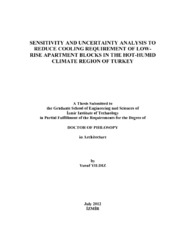Please use this identifier to cite or link to this item:
https://hdl.handle.net/11147/2935Full metadata record
| DC Field | Value | Language |
|---|---|---|
| dc.contributor.advisor | Korkmaz, Koray | en |
| dc.contributor.author | Yıldız, Yusuf | - |
| dc.date.accessioned | 2014-07-22T13:48:38Z | - |
| dc.date.available | 2014-07-22T13:48:38Z | - |
| dc.date.issued | 2012 | en |
| dc.identifier.uri | http://hdl.handle.net/11147/2935 | - |
| dc.description | Thesis (Doctoral)--İzmir Institute of Technology, Architecture, İzmir, 2012 | en |
| dc.description | Includes bibliographical references (leaves: 112-119) | en |
| dc.description | Text in English; Abstract: Turkish and English | en |
| dc.description | xi, 111 leaves | en |
| dc.description.abstract | Cooling demand in apartment buildings is an important problem due to the global warming today. Implementing passive design techniques to reduce cooling requirements cannot be possible in dense cities. Therefore, energy performance of apartment buildings usually depends on uncertainties caused by local climate and design parameters such as window size, zone height, features of materials and so on. The main aims of dissertation are to determine design parameters that have the most impact on the annual cooling energy loads for low-rise apartment blocks in hothumid climatic region of Turkey, and to evaluate uncertainty in annual cooling loads caused by design parameters and global warming. Global sensitivity and uncertainty analysis methods are performed by using morphology of an existing low-rise apartment block in Izmir, Turkey. The minor aim of thesis is to develop a practical guide to help architects while designing low-rise apartment blocks which have low cooling load located in Izmir. This practical guide was developed by using the results of sensitivity and uncertainty analyses and interviews with architects who have worked on commercial architectural projects in Izmir and are considered to be experts on energy efficiency in buildings. The results show that the sensitivity of evaluated design parameters and annual cooling energy loads in low-rise apartment blocks varies based on the effect of global warming and floors in the apartment block. In addition, total window area, natural ventilation and solar heat gain coefficient of the glazing based on the orientation have the most influence on annual cooling load of low-rise apartment blocks in hot-humid climates. Furthermore, the developed practical guide is feasible and could be used in design process of low-rise apartment blocks targeted low cooling demand in hot-humid climates. | en |
| dc.language.iso | en | en_US |
| dc.publisher | Izmir Institute of Technology | en_US |
| dc.rights | info:eu-repo/semantics/openAccess | en_US |
| dc.subject.lcsh | Architecture and energy conservation | en |
| dc.subject.lcsh | Dwellings--Energy conservation | en |
| dc.subject.lcsh | Cooling | en |
| dc.title | Sensitivity and uncertainty analysis to reduce cooling requirement of low-rise apartment blocks in the hot-humid climate region of Turkey | en_US |
| dc.type | Doctoral Thesis | en_US |
| dc.institutionauthor | Yıldız, Yusuf | - |
| dc.department | Thesis (Doctoral)--İzmir Institute of Technology, Architecture | en_US |
| dc.relation.publicationcategory | Tez | en_US |
| item.grantfulltext | open | - |
| item.openairetype | Doctoral Thesis | - |
| item.fulltext | With Fulltext | - |
| item.cerifentitytype | Publications | - |
| item.openairecristype | http://purl.org/coar/resource_type/c_18cf | - |
| item.languageiso639-1 | en | - |
| Appears in Collections: | Phd Degree / Doktora | |
Files in This Item:
| File | Description | Size | Format | |
|---|---|---|---|---|
| T001054.pdf | DoctoralThesis | 4.32 MB | Adobe PDF |  View/Open |
CORE Recommender
Page view(s)
108
checked on Jul 15, 2024
Download(s)
90
checked on Jul 15, 2024
Google ScholarTM
Check
Items in GCRIS Repository are protected by copyright, with all rights reserved, unless otherwise indicated.